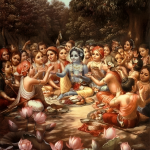Śrī Kṛṣṇa- Unborn or Born | LORD KRISHNA’S Divine Advent & Its Principles
Table of Contents
Introduction
Everything is transcendental & beyond our material calculations, whether it be His Name, Form, Qualities, or pastimes of The Lord. There is no tinge of material impurities in Him. Due to our ignorance and poor fund of knowledge, we assume Him as an ordinary person.
If we talk about ourselves, we are also not this gross material body (made of 5 gross elements), but eternal blissful spirit souls, constitutionally part and parcels of The Lord, but due to our association with matter from time immemorial, we have forgotten our original eternal identity, and have left our original loving Father..
So how can The Supreme Personality Of Godhead be an ordinary man..!?
Aja :
One of the unlimited names of The Lord is “Aja” meaning “Unborn”. So, How are we celebrating Janmastami!?
Lord Srī Krsna had entered first into the consciousness of Vasudeva, who was in the constant meditation of The Lord, and from there to the consciousness of mother Devaki, from her heart, He appeared in her most fortunate womb. One should not make the mistake by thinking that Devaki got Srī Krsna, like the human way of begetting a child. When the Lord appeared before Vasudeva and Mother Devaki, He was adorned with six opulences (knowledge, wealth, fame, strength, beauty and renunciation) to the fullest.
Even the effulgence of 100 crores of suns faded and seemed like mere fireflies in front of The Lord’s divine effulgence. The Lord at once filled the eyes of His parents with awe and reverence for Him and tears of spiritual bliss filled their eyes, and their hearts were filled with divine fearlessness. Then, from His lotus lips, He ordered His parents to take Him to Gokula.
Do any of the babies of this world come like this!?
Srīla Sukadeva Goswami reveals in Srīmad Bhagavatam {The essence of all the vedic literatures} ;
ŚB 10.2.18:
tato jagan-maṅgalam acyutāṁśaṁ
samāhitaṁ śūra-sutena devī
dadhāra sarvātmakam ātma-bhūtaṁ
kāṣṭhā yathānanda-karaṁ manastaḥ
Translation:
Thereafter, accompanied by plenary expansions, the fully opulent Supreme Personality of Godhead, who is all-auspicious for the entire universe, was transferred from the mind of Vasudeva to the mind of Devakī. Devakī, having thus been initiated by Vasudeva, became beautiful by carrying Lord Kṛṣṇa, the original consciousness for everyone, the cause of all causes, within the core of her heart, just as the east becomes beautiful by carrying the rising moon.
The Lord Himself says in Bg. 10.3 ;
yo mām ajam anādiṁ ca
vetti loka-maheśvaram
asammūḍhaḥ sa martyeṣu
sarva-pāpaiḥ pramucyate
Translation:
He who knows Me as the unborn, as the beginningless, as the Supreme Lord of all the worlds – he only, undeluded among men, is freed from all sins.
Lord Śrī Kṛṣṇa says in B. G. 7.7;
mattaḥ parataraṁ nānyat
kiñcid asti dhanañ-jaya
mayi sarvam idaṁ protaṁ
sūtre maṇi-gaṇā iva
Translation:-
O conqueror of wealth, there is no truth superior to Me. Everything rests upon Me, as pearls are strung on a thread.
Let’s dive into the world of divinity, & know what great acharyas and Lord Brahma say about Lord Śrī Kṛṣṇa.
The Divine Concept Of Divinity

In Brahma Samhita 5.1Lord Brahma says;
ishvarah paramah krishnah
sac-cid-ananda-vigrahaha
anadir adir govindaha
sarva-karana-karanam
Translation:-
Krsna who is known as Govinda is the Supreme Godhead. He has an eternal blissful spiritual body. He
is the origin of all. He has no other origin and He is the prime cause of all causes.
Kṛṣṇa’s transcendental body is eternal, full of knowledge and bliss. Sat means ever-existing for all time and in all places; in other words, all-pervading in time and space. Cit means full of knowledge. Kṛṣṇa has nothing to learn from anyone. He is independently full of all knowledge. Ānanda means the reservoir of all pleasure.
(Nectar of Devotion).
In the Viṣṇu-yāmala-tantra there is a statement that because the Personality of Godhead and His expanded bodies are always full of knowledge, bliss and eternity, they are always free from the eighteen kinds of material contaminations—illusion, fatigue, errors, roughness, material lust, restlessness, pride, envy, violence, disgrace, exhaustion, untruth, anger, hankering, dependence, desire to lord over the universe, seeing duality and cheating.
(Nectar of Devotion)

Lord Śrī Kṛṣṇa affirms in Bhagavad-Gītā in 4.9;
janma karma ca me divyam
evaṁ yo vetti tattvataḥ
tyaktvā dehaṁ punar janma
naiti mām eti so ’rjuna
Translation:-
One who knows the transcendental nature of My appearance and activities does not, upon leaving the body, take his birth again in this material world, but attains My eternal abode, O Arjuna.
Matchless purport by A. C. Bhaktivedanta Swami Prabhupāda
Purport:-
The Lord’s descent from His transcendental abode is already explained in the sixth verse. One who can understand the truth of the appearance of the Personality of Godhead is already liberated from material bondage, and therefore he returns to the kingdom of God immediately after quitting this present material body. Such liberation of the living entity from material bondage is not at all easy. The impersonalists and the yogīs attain liberation only after much trouble and many, many births. Even then, the liberation they achieve – merging into the impersonal brahma-jyotir of the Lord – is only partial, and there is the risk of returning to this material world.
But the devotee, simply by understanding the transcendental nature of the body and activities of the Lord, attains the abode of the Lord after ending this body and does not run the risk of returning to this material world. In the Brahma-saṁhitā (5.33) it is stated that the Lord has many, many forms and incarnations: advaitam acyutam anādim ananta-rūpam. Although there are many transcendental forms of the Lord, they are still one and the same Supreme Personality of Godhead. One has to understand this fact with conviction, although it is incomprehensible to mundane scholars and empiric philosophers. As stated in the Vedas (Puruṣa-bodhinī Upaniṣad):
eko devo nitya-līlānurakto
bhakta-vyāpī hṛdy antar-ātmā
“The one Supreme Personality of Godhead is eternally engaged in many, many transcendental forms in relationships with His unalloyed devotees.” This Vedic version is confirmed in this verse of the Gītā personally by the Lord. He who accepts this truth on the strength of the authority of the Vedas and of the Supreme Personality of Godhead and who does not waste time in philosophical speculations attains the highest perfectional stage of liberation. Simply by accepting this truth on faith, one can, without a doubt, attain liberation.
The Vedic version tat tvam asi is actually applied in this case. Anyone who understands Lord Kṛṣṇa to be the Supreme, or who says unto the Lord, “You are the same Supreme Brahman, the Personality of Godhead,” is certainly liberated instantly, and consequently his entrance into the transcendental association of the Lord is guaranteed. In other words, such a faithful devotee of the Lord attains perfection, and this is confirmed by the following Vedic assertion:
tam eva viditvāti mṛtyum eti
nānyaḥ panthā vidyate ’yanāya
“One can attain the perfect stage of liberation from birth and death simply by knowing the Lord, the Supreme Personality of Godhead, and there is no other way to achieve this perfection.” (Śvetāśvatara Upaniṣad 3.8) That there is no alternative means that anyone who does not understand Lord Kṛṣṇa as the Supreme Personality of Godhead is surely in the mode of ignorance and consequently he will not attain salvation simply, so to speak, by licking the outer surface of the bottle of honey, or by interpreting the Bhagavad-gītā according to mundane scholarship. Such empiric philosophers may assume very important roles in the material world, but they are not necessarily eligible for liberation. Such puffed-up mundane scholars have to wait for the causeless mercy of the devotee of the Lord. One should therefore cultivate Kṛṣṇa consciousness with faith and knowledge, and in this way attain perfection.
Conclusion
In B. G. 4.6 , Lord Śrī Kṛṣṇa says;
ajo ’pi sann avyayātmā
bhūtānām īśvaro ’pi san
prakṛtiṁ svām adhiṣṭhāya
sambhavāmy ātma-māyayā
Translation:-
Although I am unborn and My transcendental body never deteriorates, and although I am the Lord of all living entities, I still appear in every millennium in My original transcendental form.
So, let’s prepare our consciousness for the divine appearance of The Lord in our hearts too!, by reading and knowing from the authentic treasures that The Lord and the great acharyas have stored for us and dive into the realm of divinity, eternity, and bliss!




